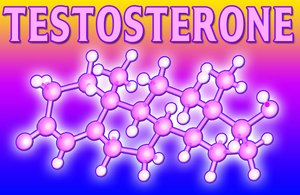 According to Forbes, “you’re not the man your father was.” Yikes, that’s harsh. But it may actually be true...in terms of testosterone levels. Testosterone therapy has been on the rise over the past two decades or so, but it’s not all due to the increase in marketing campaigns and advertising towards men to boost their testosterone with supplements and therapy. There actually is a medical phenomenon going on today with modern men. In fact, across the population, men have less testosterone than men of the same age just one generation ago. Why is this? The answer is pretty complicated.
According to Forbes, “you’re not the man your father was.” Yikes, that’s harsh. But it may actually be true...in terms of testosterone levels. Testosterone therapy has been on the rise over the past two decades or so, but it’s not all due to the increase in marketing campaigns and advertising towards men to boost their testosterone with supplements and therapy. There actually is a medical phenomenon going on today with modern men. In fact, across the population, men have less testosterone than men of the same age just one generation ago. Why is this? The answer is pretty complicated.
Research Confirms Testosterone Counts are Lower Than Just a Few Decades Ago
From 2010 to 2013, prescriptions for testosterone replacement therapy (TRT) more than doubled. Men are experiencing serious issues with their testosterone levels. In fact, all men should be concerned with their T levels considering the fact that low-T can cause sexual dysfunction and even lead to depression and anxiety. The studies are proving that testosterone levels in men have been declining for decades. In 2007, a study from the Journal of Clinical Endocrinology and Metabolism, showed a significant drop in testosterone levels since the 1980s, with average T levels declining by about 1% a year.
To put this into perspective, this means that a 60-year-old male in 2004 had 17% lower testosterone levels than that of a 60-year-old male in 1987. And the levels have gotten even worse since then. A study in Denmark showed double-digit declines in T levels in men born in the 1960s compared to those born in the 1920s. A sex counselor, Ian Kerner, told CNN that he has noticed “an increasing number of young guys are complaining of sexual concerns, such as diminished libido and erectile problems, more commonly seen in older men.”
 It’s Not Just Testosterone Levels That are a Health Concern for Men
It’s Not Just Testosterone Levels That are a Health Concern for Men
Men have other sexual health concerns to worry about besides just low testosterone, although these issues are probably connected. With testosterone levels on the decline, reproductive disorders, such as testicular cancer, are on the rise. Alongside declining testosterone levels are sinking sperm counts. Coincidentally, musculoskeletal strength is diminishing in young men. In 2016, a study demonstrated that the average 20- to 34-year-old man could apply just 98 pounds of force with a right-handed grip (grip strength) which is less than the 117 pounds of force exhibited by men of the same age in 1985. Interestingly, grip strength is a strong predictor of future mortality.
Why are Testosterone Levels on the Decline Worldwide?
The answer as to why this is happening is very complicated. However, the answer is most likely linked to the increased rates of obesity. Increased fat suppresses testosterone production. It could also be linked to lower rates of smoking in men. This is due to the fact that nicotine is a potent aromatase inhibitor. Aromatases are enzymes that convert androgens, like testosterone, into estrogen. However, in the 2007 study mentioned earlier, the age-matched declines were the same even after controlling for these two variables (obesity and smoking). Many researchers believe that the focus should be on environmental toxins, including pesticides, parabens, phthalates and bisphenol-A (BPA).
Another potential reason for the massive decline in testosterone levels could be that most men’s lifestyles have drastically changed over the past fifty years or so. For example, modern men (such as millenials or Gen X) are far, far less likely to have jobs that involve manual labor. Therefore, their bodies do not need as much muscle or strength on a daily basis, like previous generations did.
 In addition, certain close-knit relationships, such as marriage, fatherhood and more time spent with children, are causally linked to lower testosterone levels. This is due to rises in prosocial hormones, especially oxytocin which is naturally antagonistic to testosterone and promotes more loving, caring and empathy type feelings. However, both Gen X and the Millenials are marrying later and having fewer kids. But, this also means that young men are living with other people more often, such as in dorms and in apartments shared with others, and this increases the hormones like oxytocin.
In addition, certain close-knit relationships, such as marriage, fatherhood and more time spent with children, are causally linked to lower testosterone levels. This is due to rises in prosocial hormones, especially oxytocin which is naturally antagonistic to testosterone and promotes more loving, caring and empathy type feelings. However, both Gen X and the Millenials are marrying later and having fewer kids. But, this also means that young men are living with other people more often, such as in dorms and in apartments shared with others, and this increases the hormones like oxytocin.
Clearly, the answer as to why this is happening is not clear and will take multiple studies to determine the cause, if it can be determined. Even though this is the case, it doesn’t mean that you can’t do something about it for yourself.
Get Your Testosterone Levels Checked Regularly
It’s best not to let this information scare you. There are ways to naturally boost testosterone levels which are generously discussed on our website. Testosterone replacement therapy is also simple to undergo when done under the care of a physician or endocrinologist, such as the ones at our clinic. Consider getting your testosterone levels checked annually, just to ensure everything is A-OK. It’s best to catch low testosterone levels early before some of the worst symptoms begin, such as reduced muscle strength, anxiety and depression.
Low testosterone is defined as levels at less than 300 nanograms per deciliter (ng/dL). When testosterone levels are at a normal level, it promotes attention, memory, energy and spatial reasoning. In addition, it increases libido and muscle mass in men. It even increases libido in women, who need testosterone also, but in much smaller amounts.
 When testosterone levels get too low, men will start to feel fatigued, lose interest in sex, gain weight and lose muscle mass. Psychological issues such as depression and less confidence in oneself can also develop. As you can see, testosterone really affects men’s health – it is what makes men, be, well, MEN!
When testosterone levels get too low, men will start to feel fatigued, lose interest in sex, gain weight and lose muscle mass. Psychological issues such as depression and less confidence in oneself can also develop. As you can see, testosterone really affects men’s health – it is what makes men, be, well, MEN!
So, remember, eat a healthy diet, exercise more often, get a good night’s sleep, avoid plastic containers and get your testosterone levels checked regularly.
Contact our clinic today to get your levels checked easily and quickly. All it takes is a simple blood test!
References
Contact Us Today For A Free Consultation

- Cano's spokeswoman was client of Biogenesis [Last Updated On: January 25th, 2024] [Originally Added On: May 4th, 2013]
- Documents: Cano associate was client of clinic [Last Updated On: January 25th, 2024] [Originally Added On: May 4th, 2013]
- Sources: Cano associate was Biogenesis client [Last Updated On: January 25th, 2024] [Originally Added On: May 4th, 2013]
- Early Stage Testicular Cancer - Surveillance Is Best Follow-Up Strategy [Last Updated On: January 25th, 2024] [Originally Added On: May 18th, 2013]
- 2013 Endocrine Function Testing Market in Europe: Hospitals, Commercial Labs, Physician Offices, Ambulatory Care Centers [Last Updated On: January 25th, 2024] [Originally Added On: June 14th, 2013]
- Europe Endocrine Function Testing Market Studied by VPG in Cutting-Edge Report Now Available at MarketPublishers.com [Last Updated On: January 25th, 2024] [Originally Added On: June 18th, 2013]
- A More 'Natural' Version Of IVF Proves A Success [Last Updated On: January 25th, 2024] [Originally Added On: June 19th, 2013]
- Weight Loss Cure with Metabolic Cookbook - Video [Last Updated On: January 25th, 2024] [Originally Added On: July 12th, 2013]
- Weight Loss Drops - Are They A Scam? - Video [Last Updated On: January 25th, 2024] [Originally Added On: July 12th, 2013]
- Abbott Features Solutions to Help Labs Prepare for the Evolving Healthcare Landscape at the American Association for ... [Last Updated On: January 25th, 2024] [Originally Added On: July 30th, 2013]
- How Testicular Cancer Is Diagnosed | Testicular Cancer - Video [Last Updated On: January 25th, 2024] [Originally Added On: August 11th, 2013]
- 2014 Opportunities in the US Clinical Chemistry and Immunodiagnostics Markets [Last Updated On: January 25th, 2024] [Originally Added On: September 27th, 2013]
- Serie A - Doping ban overturned on cancer sufferer Acerbi [Last Updated On: January 25th, 2024] [Originally Added On: January 8th, 2014]
- Health Highlights: Jan. 8, 2014 [Last Updated On: January 25th, 2024] [Originally Added On: January 8th, 2014]
- Testosterone Replacement Therapy [Last Updated On: December 9th, 2023] [Originally Added On: January 19th, 2014]
- Paid Hepatitis C Clinical Trial Now Enrolling at Avail Clinical Research near Orlando, Florida; Accepting M/F Patients ... [Last Updated On: January 25th, 2024] [Originally Added On: January 22nd, 2014]
- Luteal Phase: The Uterine Lining Phase - Video [Last Updated On: January 25th, 2024] [Originally Added On: April 10th, 2014]
- Doping case against Acerbi dismissed [Last Updated On: January 25th, 2024] [Originally Added On: April 15th, 2014]
- Drugs that Cause Gynecomastia [Last Updated On: January 25th, 2024] [Originally Added On: May 14th, 2014]
- Illegal Online Meds Targeted in Worldwide Crackdown, FDA Says [Last Updated On: January 25th, 2024] [Originally Added On: May 24th, 2014]
- Biogenesis' Bosch surrenders in PEDs case [Last Updated On: January 25th, 2024] [Originally Added On: August 5th, 2014]
- Duchess of Cambridge 'hugely disappointed' after being forced to pull out of yet another engagement due to morning ... [Last Updated On: January 25th, 2024] [Originally Added On: October 1st, 2014]
- Kate, Duchess of Cambridge dazzles in baby blue gown at the Natural History Museum [Last Updated On: January 25th, 2024] [Originally Added On: October 22nd, 2014]
- 'They're poisoning us'. How religious leaders are hindering vaccination programmes across the world [Last Updated On: January 25th, 2024] [Originally Added On: November 14th, 2014]
- Poor prognosis germ-cell tumours are only cured in about half of patients. We aimed to assess whether treatment ... [Last Updated On: January 25th, 2024] [Originally Added On: November 23rd, 2014]
- Nursing a Grudge [Last Updated On: January 25th, 2024] [Originally Added On: January 22nd, 2015]
- Hormone Levels in Men - Testosterone Injections [Last Updated On: November 30th, 2021] [Originally Added On: September 9th, 2016]
- Human Growth Hormone May Actually IMPROVE Quadricep Strength After Reconstruction of Torn ACL [Last Updated On: September 23rd, 2024] [Originally Added On: June 22nd, 2020]
- Six Ways to Feel Good and Balance Your Hormones at the Same Time! [Last Updated On: January 25th, 2024] [Originally Added On: September 24th, 2020]
- Your Birthplace Heavily Influences Your Future Testosterone Levels [Last Updated On: August 19th, 2024] [Originally Added On: March 6th, 2021]
- Both High and Low Levels of Testosterone Correlate With Cardiovascular Issues in Men [Last Updated On: September 27th, 2024] [Originally Added On: April 14th, 2021]
- Breaking News: Testosterone May Be the Answer to Autoimmune Diseases [Last Updated On: August 24th, 2024] [Originally Added On: May 14th, 2021]
- Non-Stop Cravings for Protein? Blame it on Your Gut Hormones! [Last Updated On: September 13th, 2024] [Originally Added On: May 21st, 2021]
- Testosterone Therapy Could Help Quell Your Asthma Attacks [Last Updated On: September 12th, 2024] [Originally Added On: June 20th, 2021]
- BPA Here, BPA There, What’s the Reason for the Scare? [Last Updated On: September 16th, 2024] [Originally Added On: June 29th, 2021]
- Low Testosterone Linked to Depression and Suicidal Ideation [Last Updated On: August 25th, 2024] [Originally Added On: July 5th, 2021]
- Losing Weight with Baratric Surgery Reverses Low Testosterone [Last Updated On: October 2nd, 2024] [Originally Added On: February 8th, 2022]
- Do Larger Testicles Make More Testosterone? [Last Updated On: July 24th, 2024] [Originally Added On: May 3rd, 2022]
- Fact or Myth: Have Testosterone Levels Really Dropped by 50% Just in the Past Two Decades? [Last Updated On: August 14th, 2024] [Originally Added On: June 4th, 2022]
- Another Analysis Shows No Cardiovascular Risks With Testosterone Therapy [Last Updated On: October 6th, 2024] [Originally Added On: November 27th, 2022]
Word Count: 988




















